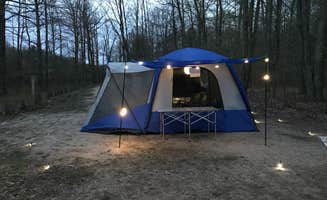Dispersed camping near Alpena, Michigan provides access to secluded woodland sites with elevations ranging from 600 to 900 feet. The area experiences four distinct seasons with summer temperatures averaging 75-80°F and winter lows often below freezing. Most primitive sites in this region require self-sufficiency as they're located on undeveloped Forest Service land without marked boundaries.
What to do
Hiking connections: The Huron-Manistee National Forest connects to the North Country Trail, creating opportunities for multi-day backpacking excursions. "We walked this trail for 5 days and 4 nights. Cell service was spotty, which was the goal. Lots of wildlife and great views," notes Megan C. about her backpacking experience.
Water recreation: The Manistee River provides swimming and kayaking opportunities alongside primitive campsites. "The dunes along the river seem out of place, and wonderfully so. You could spend so much time here, climbing around, swimming, kayaking, and enjoying the views," explains Maggie M. about her unplanned camping adventure.
Wildlife observation: Early morning and dusk offer prime wildlife viewing opportunities. At De Cheau Lake Camping, one camper described being "blessed by the Elk bugles nearby," making this a notable location for wildlife enthusiasts, especially during rutting season.
What campers like
Trail maintenance: The well-kept trail systems make navigation easier for backpackers and day hikers. "The trails are always so maintained, the sites are easy to find and always marked," reports Jessica D. about her dispersed camping experiences in the national forest.
Site isolation: Many primitive campsites offer genuine seclusion from other campers. "The nearest other campers were not within earshot nor could we see them," writes Megan C. about the privacy of backcountry sites.
Elevation changes: The topography provides camping options on both ridges and riverbanks. "This forest area is unique because it offers large changes in elevation that you do not typically get in Michigan, especially not in the lower peninsula," notes Anna C., who recommends trying both hilltop and riverside camping for variety.
What you should know
Water filtering requirements: Natural water sources require treatment before consumption. "The River trail supplied us with our water needs for cooking and drinking, from the Manistee River," shares Brenda M., though water filtration remains essential for safety.
Permit requirements: De Cheau Lake Camping requires a Michigan Recreation Passport. "Posted on Southern entrance: Michigan Rec Passport Required," confirms a recent visitor who noted the area "feels more remote than it really is."
Location planning: Having multiple potential sites mapped before arrival increases success. "Use a GPS system or a program to ensure you are not in private property. Have at least 3 sites as possibilities," advises Agapes D., highlighting the importance of advance research.
Waste management: No facilities means bringing supplies for human waste disposal. "Bring a garden trowel and toilet paper," recommends one backpacker who spent multiple nights traversing the trails.
Tips for camping with families
Multi-generational trips: The varied terrain accommodates family backpacking adventures. "We had 11 Grandkids with us, and we had 9 backpacking tents. The children all carried their own tents, sleeping bags, and food for 4 days," recounts Brenda M. about their successful family outing.
Loop trail advantage: The combination of North Country Trail and Manistee River Trail creates a perfect family backpacking loop of approximately 20 miles. "I love this loop trail because you can hike in and out without having to backtrack or coordinate a ride back to your parked car," notes one frequent visitor.
Nearby attractions: Primitive camping can be combined with visits to popular natural areas. One camper mentions the primitive sites "aren't far from the sleeping dunes national lakeshore or the empire bluff trail which is a must!"
Tips from RVers
Site assessment: While most dispersed sites accommodate smaller RVs, advanced scouting helps with larger vehicles. At De Cheau Lake Camping, campers note it's "big-rig friendly" with "lots of room for multiple vehicles/sites," making it suitable for those with larger setups.
Road noise consideration: Some primitive sites experience minimal road noise. "Can hear the state route from the site but it was low volume traffic," reports one RVer about De Cheau Lake, suggesting selecting sites further from main roads for those sensitive to traffic sounds.
Preparation for isolation: RV campers should arrive fully self-contained. "Didn't see anyone else during the stay," notes one camper, emphasizing the truly isolated nature of these primitive sites where assistance may not be readily available.


